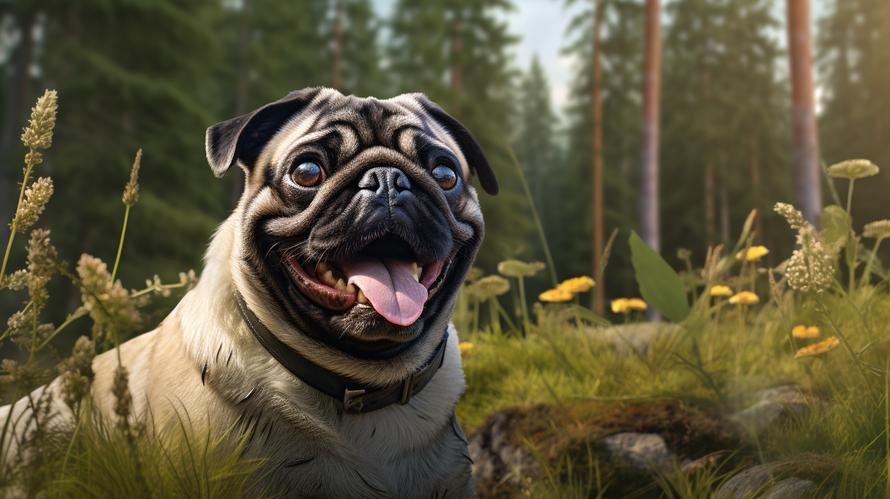When you picture a Pug, what comes to mind? For many, it’s their iconic squashed face, those large, endearing eyes, and a distinctly curly tail, willing to spin on a whim of happiness. But have you ever wondered just how smart your comical little companion might be? You’re probably thinking something along the lines of, “Sure, they’re cute—but are Pugs intelligent?” Well, you might be pleasantly surprised by what research has to suggest.
Grab yourself a cup of your favorite caffeine or maybe a comfortable throw because we’re about to plunge into a fascinating journey of canine cognition. We’re talking interactive toys, groundbreaking studies, and a fresh perspective on what ‘intelligence’ truly means in the canine world.
Now, when it comes to measuring intelligence, it’s pretty straightforward for humans. We have IQ tests, aptitude exams—basically, a structured system. But how does one measure intelligence in dogs? According to Dr. Stanley Coren, a renowned psychologist and canine behaviorist, dog intelligence comprises three different components: instinctive intelligence, adaptive intelligence, and working & obedience intelligence.
Instinctive intelligence refers to the skills that a particular breed was developed for. For instance, Labrador Retrievers were bred to retrieve games, and thus, the breed is naturally good at it. Pugs, meanwhile, were bred as companions, implying their instinctive intelligence lies in their social skills. And anyone who’s spent time with a Pug knows they excel remarkably in this area, making them emotionally intelligent.
Adaptive intelligence refers to a dog’s problem-solving abilities—how well they can figure out things independently. Can your Pug escape from a fenced area or find a hidden treat? If yes, they score high on adaptive intelligence—but that does not necessarily imply they’ll perform well in school!
The third type, working and obedience intelligence, equates to what we may call ‘school-learning.’ It’s about how quickly dogs can learn commands and tasks while obeying the first command most of the time. Now, for the pressing question—where do Pugs land on this spectrum?
On the surface, it may appear that Pugs are not the brightest crayons in the box when compared to breeds like Border Collies or Golden Retrievers. However, comparing intelligence across breeds can be tricky and often misleading because it tends to value obedience over other kinds of intelligence. In fact, Pugs are known for their independent and somewhat stubborn nature, which often gets misconstrued as a lack of intelligence.
However, on gaining a deeper understanding of their behavior, you’ll realize that these adorable pups are actually quite ingenious. They’re independent thinkers, known to employ their charm and manipulation tactics to get what they want—an evident display of their social and emotional intelligence. Let’s not forget their notorious aptitude for escaping enclosures, cunningly making their way into kitchen cabinets or figuring out the puzzle toys—these all indicate an impressive level of the so-called adaptive intelligence.
One of the most enchanting (and entertaining!) qualities of Pugs is their incredible sense of humor. They’re not just amusing in their antics, but they seem to genuinely understand wit and love making their human companions laugh. It makes perfect sense if you recall that they were bred as companions—to entertain their owners and the royal courts. This breed took the funny bone from their ancestors and ran with it!
So, how do we bring out the best in our intelligent and amusing little furballs? One way is to play interactive games that tap into their adaptive intelligence. Puzzle toys and treat-dispensing games are a great way to keep those little canine minds stimulated. Also, obedience training from an early age shaped with positive reinforcement techniques can incredibly enhance their compliance.
In the end, measuring intelligence in breeds can be subjective, depending on the metrics we use to define it. Sure, Pugs might not always be the star pupils in doggy obedience class, but they’re some of the finest when it comes to emotional and adaptive intelligence. And to many, the loyalty, companionship, and laughter these endearing creatures provide are the truest forms of canine intelligence.
So, is the Pug the smartest dog? Well, when it comes to wit, charm, and emotional savvy, they just might be. Intelligence is a complex spectrum, and every breed excels in its unique fashion. And let’s face it—when your Pug looks at you with those deep, understanding eyes, it’s hard not to think they’re the smartest dog around!



